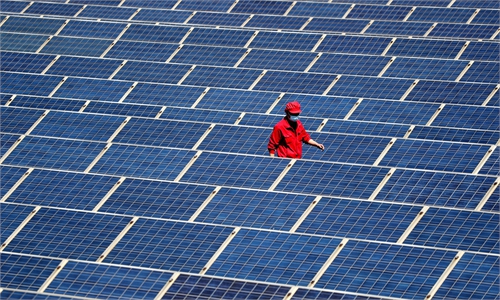
Illustration: Chen Xia/Global Times
It is no secret that Apple has been pursuing a strategy to diversify its supply chain by relocating some production lines from China to other regions, a move that has frequently made headlines. However, the problems encountered by iPhone factories in India have raised concerns about the viability and reliability of this strategy, prompting renewed skepticism regarding the tech giant's plans to reduce "reliance" on China.For instance, an article published on Tuesday by the Al Jazeera Chinese website, headlined "Defects and fire in plants: Will Apple's plan to withdraw from China fail?" pointed out that Apple's initiative to relocate some of its iPhone manufacturing to India is not progressing smoothly. Both the iPhone 15 and iPhone 16 have experienced various manufacturing defects, and a major fire recently broke out at a facility belonging to one of Apple's key contract manufacturers for iPhone components.
While India has emerged as an attractive alternative to China for Apple thanks to its lower labor costs and vast market potential, the challenges faced by iPhone contract manufacturers in India in terms of production efficiency, product quality, labor relations and infrastructure suggest that Apple's and other firms' production in China is not to be easily replaced.
First, China's labor advantage remains compared with other countries. Compared with China's well-established skilled workforce, Indian workers often lack the necessary technical training and experience, resulting in a higher incidence of manufacturing defects in factories making precision electronic products.
This significantly affects both production efficiency and product quality. If Apple aims to replicate its efficient production model in India, its foremost challenge will be to swiftly enhance the quality of the labor force, a task that cannot be accomplished in the short term.
Second, labor management and union issues are among the challenges Apple faces in India. India's labor market is complex, characterized by strong union influence and often strained labor relations. Frequent strikes and protests by workers may disrupt production schedules and escalate operational costs. Samsung's Indian plant has recently experienced production disruptions due to labor issues. As a result, foreign manufacturers often have to navigate a myriad of labor management challenges.
Third, Chinese equipment and intermediate goods are still needed in Apple's Indian plants. While India has made significant strides in certain areas, such as aerospace technology, it still uses Chinese components and equipment for high-end manufacturing and the production of precision industrial goods, an example of a strong industry chain and mutually beneficial business cooperation.
The production of iPhone devices involves numerous high-tech components, which often calls for advanced technology and equipment that have yet to be fully developed for localized production in India.
Fourth, inadequate infrastructure development poses a significant challenge for Apple in India. While the country has made strides in recent years, it still lags behind what is needed for mass production and trade.
Issues related to transportation, logistics and power supply can directly affect production efficiency and the timely delivery of products. Compared with China's well-established manufacturing supply chain, India's infrastructure inevitably leads to higher operational costs and increased management complexities.
To a certain extent, whether Apple can establish an efficient and stable production line in India hinges on the resolution of these issues, which demands considerable time, investment and resources to address.
While Apple has high aspirations for the Indian market and aims to shift a portion of its production lines to India, the current landscape and challenges faced by Indian factories suggest that the plan is no easy task. In the realm of high-end manufacturing and the production of precision industrial goods, India still has considerable strides to make; without substantial improvements in these areas, iPhone factories in India may struggle to match the efficiency and quality standards achieved in its Chinese factories.
In addition, Apple's experience in navigating the complexities of the Indian manufacturing environment could serve as a crucial case study for other multinational corporations as they consider their global strategies.



